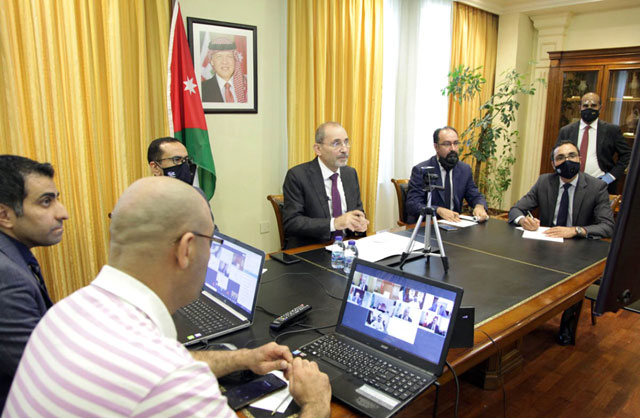AMMAN — The foreign ministers of Jordan, the UAE, Saudi Arabia, Egypt, Morocco and Palestine, the member states of the ministerial delegation of the Arab Peace Initiative, on Tuesday held a meeting.
Tunisia, the Arab member of the UN Security Council, Oman, the head of the current Arab League session, Kuwait and the Arab League secretary general also participated in the meeting, which was hosted by Jordan to discuss means to stop the implementation of the Israeli decision to annex occupied Palestinian lands, according to a Foreign Ministry statement.
At the end of the meeting, held via videoconference, the participating foreign ministers and the Arab League secretary general issued a final statement that reiterated full support for Palestinians in their endeavours to attain their legitimate rights.
They also highlighted the need for Palestinians to realise their rights to freedom and a viable, independent state with East Jerusalem as its capital on the pre-1967 lines based on the two-state solution, international law and the Arab Peace Initiative.
The ministers and the secretary general expressed their rejection of any annexation of occupied Palestinian lands, which violates international law and undermines opportunities to reach a two-state solution and maintain other pillars of the peace process, the Foreign Ministry statement said.
They also called on the international community to adopt clear stances and procedures to prevent the implementation of the annexation decision in order to preserve international law and peace.
The statement called for a return to "serious and effective" negotiations to end the conflict through the two-state solution and relevant international resolutions until an agreement is reached that can realise comprehensive peace guaranteeing the rights of Palestinians and the security of Israel.
They also expressed commitment to the Arab Peace Initiative, which the Arab Summit adopted in 2002 in Beirut and which is "still the most suitable means to realise comprehensive and permanent peace".
The statement also voiced commitment to adhering to the Arab stance included in the Arab Peace Initiative, which highlights that the two-state solution according to international law is the "only means" to end the conflict, attain a comprehensive peace and normalise relations between Arab countries and Israel.
They also highlighted the importance of Israel not implementing the annexation decision, which will "agitate the conflict and feed extremism".
